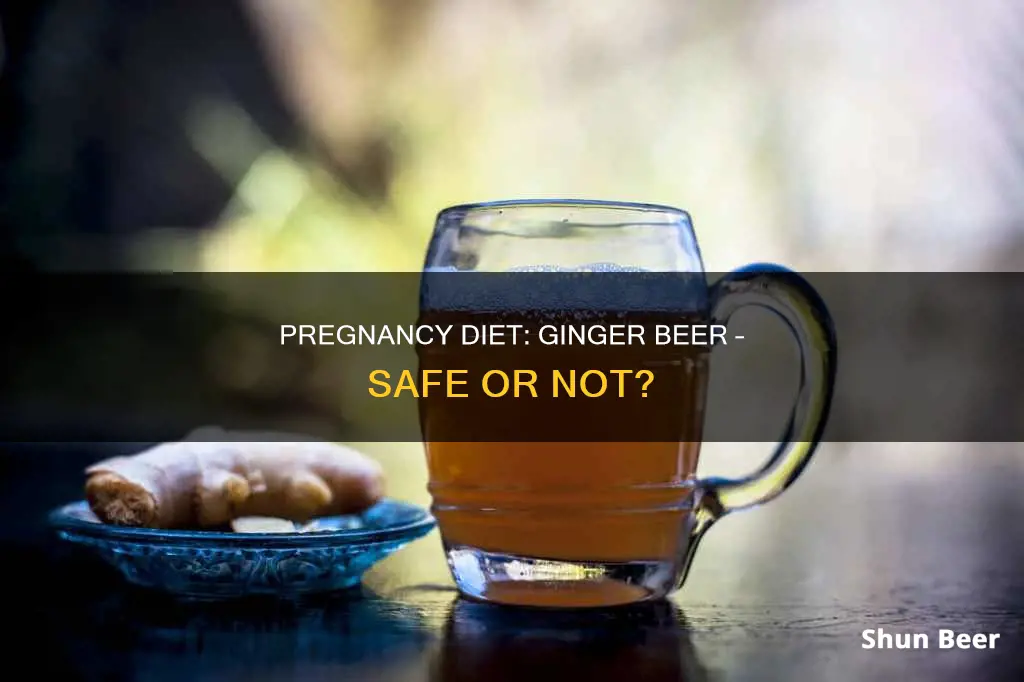
Ginger beer is a popular drink, but is it safe to consume during pregnancy? The answer depends on the type of ginger beer. Non-alcoholic ginger beer, which is similar to ginger ale, is generally considered safe for pregnant women to consume. However, alcoholic ginger beer should be avoided, as it can lead to developmental defects in the unborn baby.
Non-alcoholic ginger beer is typically a carbonated drink made with water, ginger or ginger flavouring, and a sweetener. It may also contain yeast, which gives it a slight fizz. This type of ginger beer is caffeine-free and can be a good option for pregnant women looking for a refreshing drink.
On the other hand, alcoholic ginger beer is produced by fermenting the drink with yeast, which can result in trace amounts of alcohol. While the amount of alcohol is usually well below the threshold to classify it as an alcoholic beverage, it is still important to read labels carefully and consult a healthcare professional before consuming any ginger beer during pregnancy.
What You'll Learn
- Ginger beer is safe to consume during pregnancy when it is store-bought and non-alcoholic
- Homemade ginger beer is more likely to be contaminated with bacteria
- Ginger beer can help reduce pregnancy-related nausea and morning sickness
- Ginger beer is typically caffeine-free, unlike sodas such as root beer or cola
- The high sugar content in ginger beer may be a concern for pregnant women

Ginger beer is safe to consume during pregnancy when it is store-bought and non-alcoholic
Ginger beer is generally safe to consume during pregnancy, provided it is store-bought and non-alcoholic. While it is important to limit your sugar intake, ginger beer can be a great way to help with pregnancy-related nausea and morning sickness.
Firstly, it is crucial to understand the difference between ginger beer and ginger ale. Ginger beer is a fermented beverage with a stronger ginger flavour and less fizz than ginger ale. It is often homemade, but commercially-produced ginger beer is also available, which is typically non-alcoholic and safe for pregnant women. On the other hand, ginger ale is a carbonated soft drink with a milder ginger flavour.
When it comes to pregnancy, it is essential to avoid alcoholic beverages. According to the Centers for Disease Control and Prevention (CDC), there is no known safe amount of alcohol during any trimester of pregnancy. Therefore, pregnant women should opt for store-bought ginger beer, as homemade ginger beer may contain alcohol if it is fermented for too long. Additionally, proper sterilisation and cross-contamination prevention measures must be taken to avoid bacterial contamination in homemade ginger beer.
While store-bought ginger beer is generally safe, it is important to monitor your sugar intake. The American Heart Association recommends that women consume no more than six teaspoons or 25 grams of sugar per day. However, a single serving of Bundaberg ginger beer contains 40 grams of sugar, which is almost double the recommended amount. Therefore, it is advisable to opt for "diet" soda varieties with lower sugar and calorie content or consume ginger beer in smaller amounts. This is especially important for those with gestational diabetes, as recommended by the CDC.
One of the benefits of ginger beer during pregnancy is its potential to reduce symptoms of nausea and morning sickness. Ginger has been shown to be effective in alleviating these issues, and some sources suggest that ginger beer can be a helpful remedy. However, it is important to note that ginger beer may have very little ginger extract, and there is limited information on how it compares to other ginger remedies such as ginger tea or ginger drops.
In conclusion, ginger beer can be a safe and refreshing option during pregnancy when consumed in moderation. Opt for store-bought, non-alcoholic ginger beer and be mindful of the sugar content to ensure a healthy and enjoyable treat during this special time.
Mouthwash and Beer: Effective Mosquito Repellents or Old Wives' Tales?
You may want to see also

Homemade ginger beer is more likely to be contaminated with bacteria
The risk of bacterial contamination in homemade ginger beer is similar to that of homemade kombucha. Unless proper precautions are taken, the beverage may contain harmful bacteria that can cause illness or adverse health effects.
Additionally, if homemade ginger beer is fermented for too long, it will produce alcohol. As recommended by the Centers for Disease Control and Prevention (CDC), women should avoid alcohol during pregnancy as there is no known safe amount during any trimester.
Therefore, when it comes to ginger beer, it is generally safer for pregnant women to consume store-bought or commercially-produced varieties. These are typically non-alcoholic and free from bacterial contamination. However, it is important to read labels and be mindful of the sugar content, especially for those with gestational diabetes.
Golf and Beer: A Match Made in Heaven?
You may want to see also

Ginger beer can help reduce pregnancy-related nausea and morning sickness
Ginger beer can be an effective way to reduce pregnancy-related nausea and morning sickness. The ginger root has a long history of being an effective remedy for nausea, and its anti-nausea properties are attributed to compounds like shogaols and gingerols.
According to the American Academy of Obstetrics and Gynecology, ginger is one of the effective non-pharmaceutical natural remedies for vomiting and nausea. A 2016 study also found that consuming ginger effectively reduced morning sickness symptoms in pregnant women compared to a placebo.
However, it is important to note that not all ginger beers are created equal. Commercially-produced ginger beers are generally safe to consume during pregnancy as they are typically non-alcoholic and caffeine-free. On the other hand, homemade ginger beer may be contaminated with bacteria and could contain alcohol if fermented for too long.
While ginger beer can be a helpful remedy for pregnancy-related nausea, it is important to consume it in moderation due to its high sugar content. The American Heart Association recommends that women consume no more than six teaspoons or 25 grams of sugar per day. A single serving of Bundaberg ginger beer, for example, contains 40 grams of sugar.
Therefore, when choosing ginger beer, opt for "diet" varieties that are lower in sugar and calories, or simply enjoy the regular kind in smaller amounts. Additionally, if you have been diagnosed with gestational diabetes, it is especially important to limit your sugar intake.
In conclusion, ginger beer can be a helpful tool to reduce pregnancy-related nausea and morning sickness, but it should be consumed in moderation and with consideration for its sugar content. As always, it is best to consult your healthcare provider before incorporating new beverages into your diet during pregnancy.
Wheat Beer and E. coli: A Dangerous Mix?
You may want to see also

Ginger beer is typically caffeine-free, unlike sodas such as root beer or cola
Pregnant women should opt for store-bought or commercially-made ginger beer, as homemade ginger beer is more likely to be contaminated with bacteria and may contain higher levels of alcohol due to over-fermentation. While most commercial ginger beers are non-alcoholic, they can have trace amounts of alcohol, but this is well below the limit required to classify them as alcoholic beverages.
When choosing a ginger beer, it is advisable to opt for \"diet\" varieties with lower sugar and calorie content. This is especially important for those with gestational diabetes. The high sugar content in regular ginger beer can be a cause for concern, as it can contribute to excessive weight gain during pregnancy.
In addition to being caffeine-free, ginger beer contains ginger, which has natural anti-nausea properties. This can be beneficial in reducing pregnancy-related nausea and morning sickness. However, it is worth noting that the amount of ginger extract in ginger beer may vary, and other remedies such as ginger tea or ginger drops may provide more concentrated amounts of ginger.
Overall, while ginger beer can be a refreshing and caffeine-free option for pregnant women, it is important to consume it in moderation due to its sugar content. It is always advisable to consult with a healthcare professional before incorporating new beverages into your diet during pregnancy.
California Minors and Non-Alcoholic Beer: What's the Law?
You may want to see also

The high sugar content in ginger beer may be a concern for pregnant women
While ginger beer is generally considered safe to consume during pregnancy, the high sugar content in this drink may be a cause for concern for pregnant women.
Ginger beer is a sugary drink, and consuming too much sugar during pregnancy can lead to excess weight gain, which is associated with an increased risk of complications. According to the American Heart Association, women should limit their daily sugar intake to no more than six teaspoons or 25 grams. However, a single 12.7-ounce serving of Bundaberg ginger beer contains 40 grams of sugar, almost double the recommended amount.
Excessive sugar consumption during pregnancy can also increase the risk of gestational diabetes, which can lead to further health issues for both mother and baby. Therefore, it is important for pregnant women to monitor their sugar intake and choose lower-sugar options when possible.
When selecting ginger beer, opt for "diet" varieties that are lower in sugar and calories. If you choose to consume regular ginger beer, do so in moderation and in smaller amounts. It is also worth noting that artificial sweeteners in sugar-free drinks have not been proven safe for consumption during pregnancy, so it is best to consume these in moderation as well.
While ginger beer can be a refreshing and tasty treat during pregnancy, it is important to be mindful of the high sugar content and its potential impact on your health and that of your baby. As always, consult with your healthcare provider for personalised advice regarding your diet during pregnancy.
Antibiotics and Alcohol: A Risky Mix?
You may want to see also
Frequently asked questions
Non-alcoholic ginger beer is safe to drink during pregnancy. Alcoholic ginger beer, however, is not.
Non-alcoholic ginger beer is a carbonated drink that typically contains carbonated water, ginger or ginger flavouring, and a sweetening agent. Alcoholic ginger beer is fermented with yeast and has a more robust and spicier ginger flavour.
Yes, ginger is a natural anti-nauseant and is a popular non-pharmaceutical remedy for pregnancy-related queasiness.







